Business Laws and Corporations Act 2001: Four Friends Pty Ltd Analysis
VerifiedAdded on 2021/04/24
|9
|2179
|5
Report
AI Summary
This report provides a detailed analysis of a business law case involving Four Friends Pty Ltd. The core issues examined include the enforceability of a contract between the company and external parties (Jack and Jill), considering the scope of the company's constitution and the actions of a director (Maxwell). The report also analyzes the ability of the other shareholders (Jackson, Ellie, Macie, and Will) to prevent an expansion, dismiss directors, and restrict the sale of shares. The analysis relies heavily on the Corporations Act 2001 (Cth), specifically sections 124, 125, 127, 128, 129, 136, and 203C, as well as relevant case law such as Knight Frank Australia Pty Ltd v Paley Properties Pty Ltd, Royal British Bank v Turquand, and Gambotto v WCP Limited. The report concludes that the contract with Jack and Jill is valid, outlines the conditions under which the shareholders could have prevented the expansion, and determines the limitations on removing directors and altering the company's constitution. The report also discusses the application of replaceable rules and the impact of shareholder agreements in the context of director removal. The report provides a comprehensive overview of the legal principles and their application to the given scenario.

Running head: BUSINESS LAWS
Business Laws
Name of the student
Name of the university
Author note
Business Laws
Name of the student
Name of the university
Author note
Paraphrase This Document
Need a fresh take? Get an instant paraphrase of this document with our AI Paraphraser
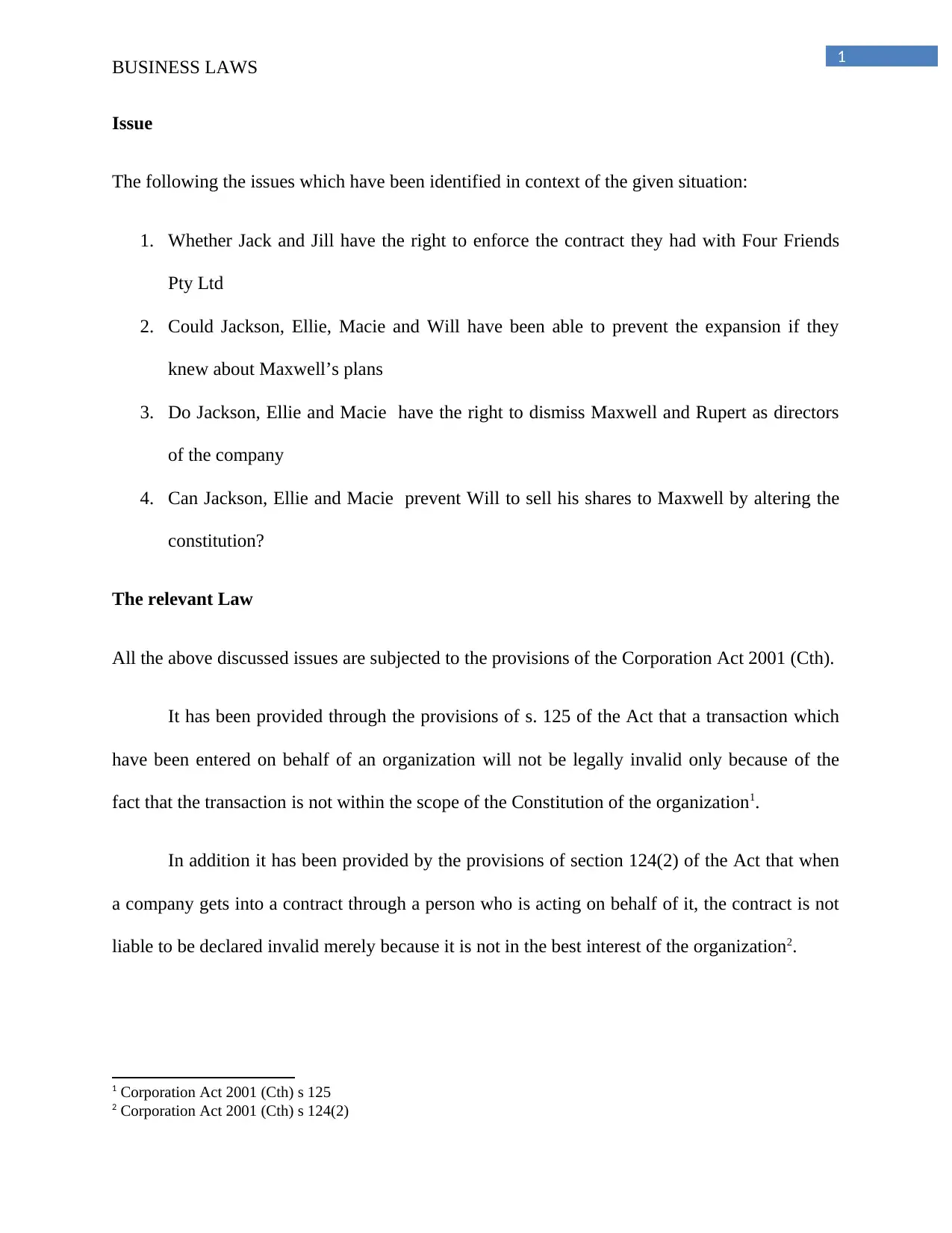
1
BUSINESS LAWS
Issue
The following the issues which have been identified in context of the given situation:
1. Whether Jack and Jill have the right to enforce the contract they had with Four Friends
Pty Ltd
2. Could Jackson, Ellie, Macie and Will have been able to prevent the expansion if they
knew about Maxwell’s plans
3. Do Jackson, Ellie and Macie have the right to dismiss Maxwell and Rupert as directors
of the company
4. Can Jackson, Ellie and Macie prevent Will to sell his shares to Maxwell by altering the
constitution?
The relevant Law
All the above discussed issues are subjected to the provisions of the Corporation Act 2001 (Cth).
It has been provided through the provisions of s. 125 of the Act that a transaction which
have been entered on behalf of an organization will not be legally invalid only because of the
fact that the transaction is not within the scope of the Constitution of the organization1.
In addition it has been provided by the provisions of section 124(2) of the Act that when
a company gets into a contract through a person who is acting on behalf of it, the contract is not
liable to be declared invalid merely because it is not in the best interest of the organization2.
1 Corporation Act 2001 (Cth) s 125
2 Corporation Act 2001 (Cth) s 124(2)
BUSINESS LAWS
Issue
The following the issues which have been identified in context of the given situation:
1. Whether Jack and Jill have the right to enforce the contract they had with Four Friends
Pty Ltd
2. Could Jackson, Ellie, Macie and Will have been able to prevent the expansion if they
knew about Maxwell’s plans
3. Do Jackson, Ellie and Macie have the right to dismiss Maxwell and Rupert as directors
of the company
4. Can Jackson, Ellie and Macie prevent Will to sell his shares to Maxwell by altering the
constitution?
The relevant Law
All the above discussed issues are subjected to the provisions of the Corporation Act 2001 (Cth).
It has been provided through the provisions of s. 125 of the Act that a transaction which
have been entered on behalf of an organization will not be legally invalid only because of the
fact that the transaction is not within the scope of the Constitution of the organization1.
In addition it has been provided by the provisions of section 124(2) of the Act that when
a company gets into a contract through a person who is acting on behalf of it, the contract is not
liable to be declared invalid merely because it is not in the best interest of the organization2.
1 Corporation Act 2001 (Cth) s 125
2 Corporation Act 2001 (Cth) s 124(2)
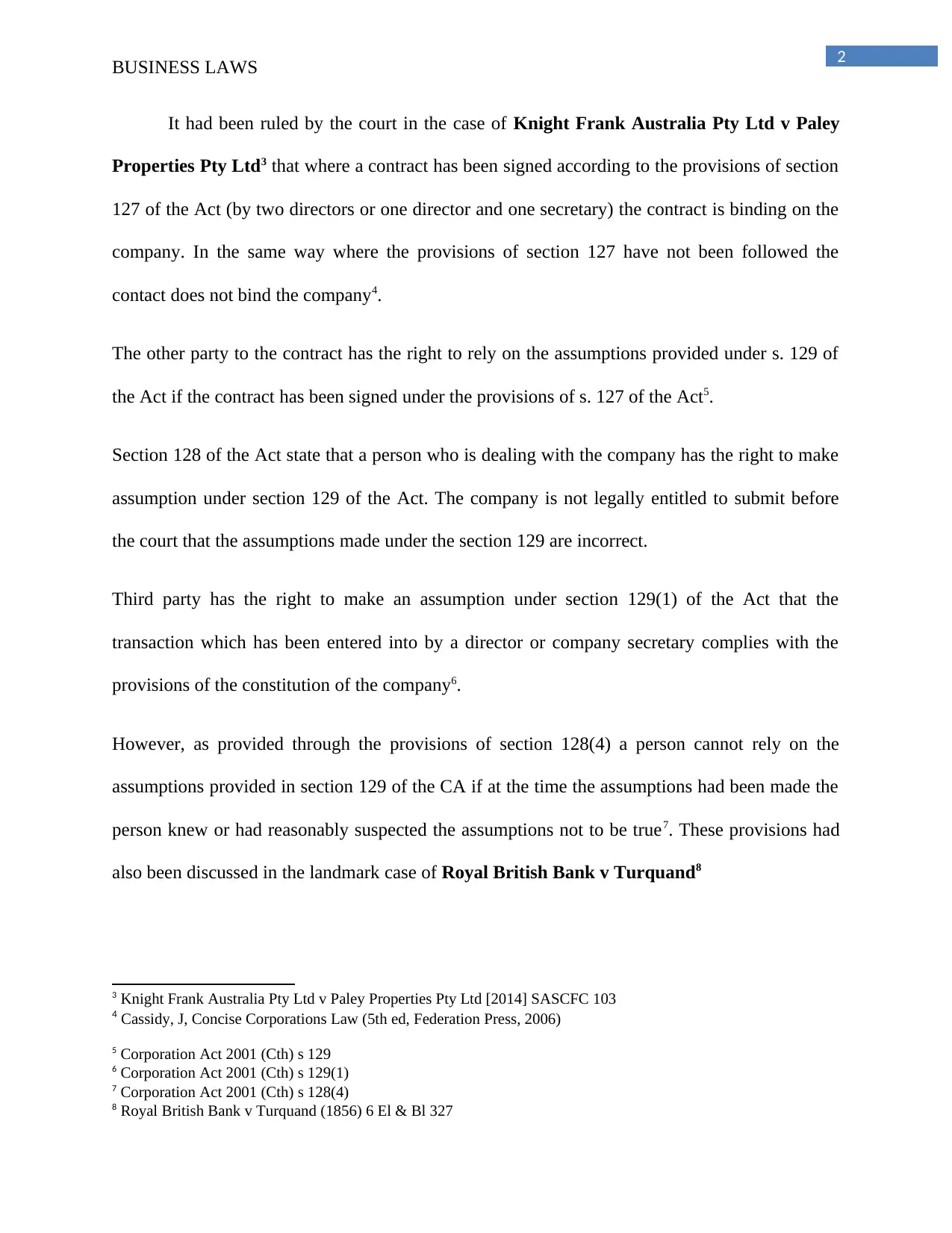
2
BUSINESS LAWS
It had been ruled by the court in the case of Knight Frank Australia Pty Ltd v Paley
Properties Pty Ltd3 that where a contract has been signed according to the provisions of section
127 of the Act (by two directors or one director and one secretary) the contract is binding on the
company. In the same way where the provisions of section 127 have not been followed the
contact does not bind the company4.
The other party to the contract has the right to rely on the assumptions provided under s. 129 of
the Act if the contract has been signed under the provisions of s. 127 of the Act5.
Section 128 of the Act state that a person who is dealing with the company has the right to make
assumption under section 129 of the Act. The company is not legally entitled to submit before
the court that the assumptions made under the section 129 are incorrect.
Third party has the right to make an assumption under section 129(1) of the Act that the
transaction which has been entered into by a director or company secretary complies with the
provisions of the constitution of the company6.
However, as provided through the provisions of section 128(4) a person cannot rely on the
assumptions provided in section 129 of the CA if at the time the assumptions had been made the
person knew or had reasonably suspected the assumptions not to be true7. These provisions had
also been discussed in the landmark case of Royal British Bank v Turquand8
3 Knight Frank Australia Pty Ltd v Paley Properties Pty Ltd [2014] SASCFC 103
4 Cassidy, J, Concise Corporations Law (5th ed, Federation Press, 2006)
5 Corporation Act 2001 (Cth) s 129
6 Corporation Act 2001 (Cth) s 129(1)
7 Corporation Act 2001 (Cth) s 128(4)
8 Royal British Bank v Turquand (1856) 6 El & Bl 327
BUSINESS LAWS
It had been ruled by the court in the case of Knight Frank Australia Pty Ltd v Paley
Properties Pty Ltd3 that where a contract has been signed according to the provisions of section
127 of the Act (by two directors or one director and one secretary) the contract is binding on the
company. In the same way where the provisions of section 127 have not been followed the
contact does not bind the company4.
The other party to the contract has the right to rely on the assumptions provided under s. 129 of
the Act if the contract has been signed under the provisions of s. 127 of the Act5.
Section 128 of the Act state that a person who is dealing with the company has the right to make
assumption under section 129 of the Act. The company is not legally entitled to submit before
the court that the assumptions made under the section 129 are incorrect.
Third party has the right to make an assumption under section 129(1) of the Act that the
transaction which has been entered into by a director or company secretary complies with the
provisions of the constitution of the company6.
However, as provided through the provisions of section 128(4) a person cannot rely on the
assumptions provided in section 129 of the CA if at the time the assumptions had been made the
person knew or had reasonably suspected the assumptions not to be true7. These provisions had
also been discussed in the landmark case of Royal British Bank v Turquand8
3 Knight Frank Australia Pty Ltd v Paley Properties Pty Ltd [2014] SASCFC 103
4 Cassidy, J, Concise Corporations Law (5th ed, Federation Press, 2006)
5 Corporation Act 2001 (Cth) s 129
6 Corporation Act 2001 (Cth) s 129(1)
7 Corporation Act 2001 (Cth) s 128(4)
8 Royal British Bank v Turquand (1856) 6 El & Bl 327
⊘ This is a preview!⊘
Do you want full access?
Subscribe today to unlock all pages.

Trusted by 1+ million students worldwide
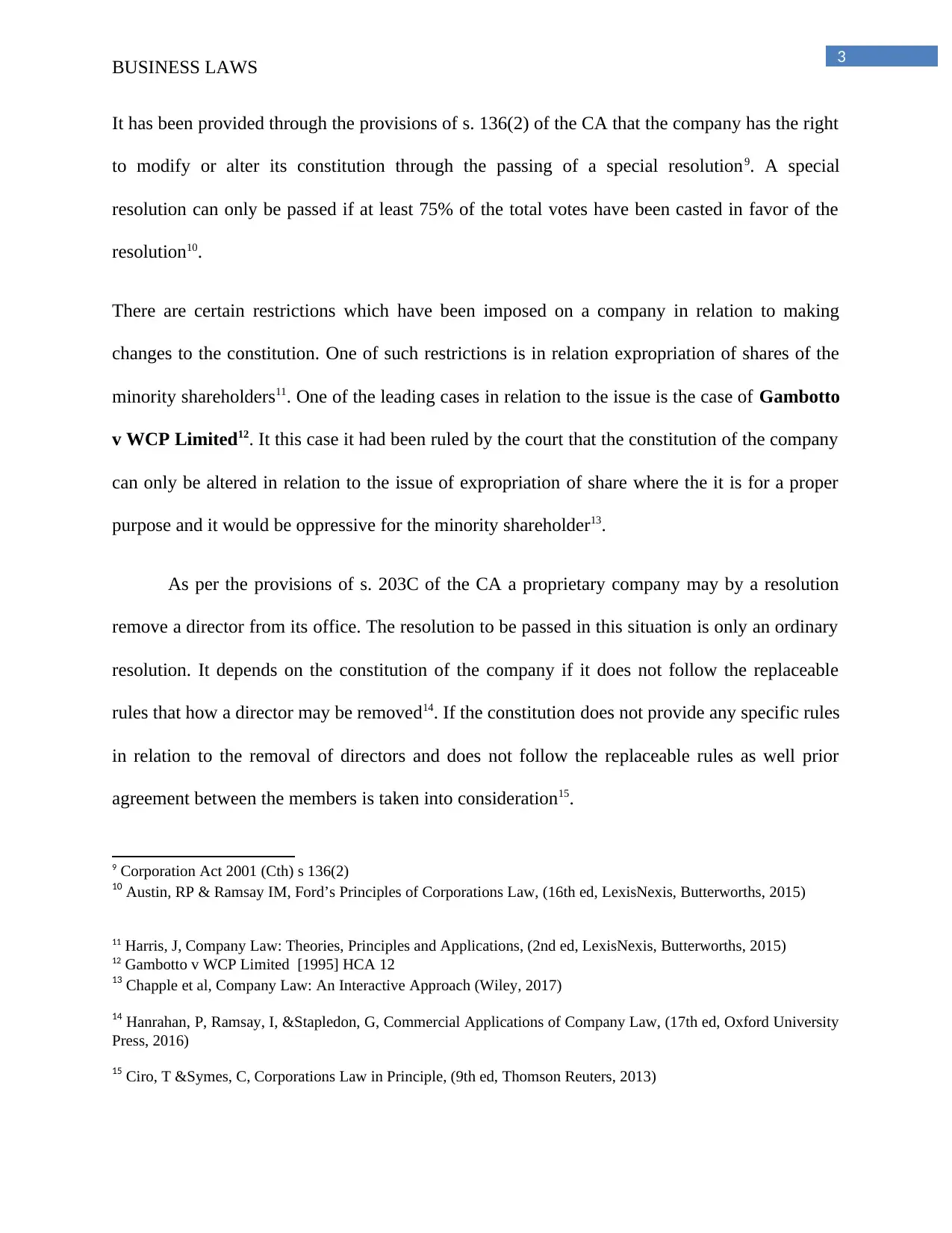
3
BUSINESS LAWS
It has been provided through the provisions of s. 136(2) of the CA that the company has the right
to modify or alter its constitution through the passing of a special resolution9. A special
resolution can only be passed if at least 75% of the total votes have been casted in favor of the
resolution10.
There are certain restrictions which have been imposed on a company in relation to making
changes to the constitution. One of such restrictions is in relation expropriation of shares of the
minority shareholders11. One of the leading cases in relation to the issue is the case of Gambotto
v WCP Limited12. It this case it had been ruled by the court that the constitution of the company
can only be altered in relation to the issue of expropriation of share where the it is for a proper
purpose and it would be oppressive for the minority shareholder13.
As per the provisions of s. 203C of the CA a proprietary company may by a resolution
remove a director from its office. The resolution to be passed in this situation is only an ordinary
resolution. It depends on the constitution of the company if it does not follow the replaceable
rules that how a director may be removed14. If the constitution does not provide any specific rules
in relation to the removal of directors and does not follow the replaceable rules as well prior
agreement between the members is taken into consideration15.
9 Corporation Act 2001 (Cth) s 136(2)
10 Austin, RP & Ramsay IM, Ford’s Principles of Corporations Law, (16th ed, LexisNexis, Butterworths, 2015)
11 Harris, J, Company Law: Theories, Principles and Applications, (2nd ed, LexisNexis, Butterworths, 2015)
12 Gambotto v WCP Limited [1995] HCA 12
13 Chapple et al, Company Law: An Interactive Approach (Wiley, 2017)
14 Hanrahan, P, Ramsay, I, &Stapledon, G, Commercial Applications of Company Law, (17th ed, Oxford University
Press, 2016)
15 Ciro, T &Symes, C, Corporations Law in Principle, (9th ed, Thomson Reuters, 2013)
BUSINESS LAWS
It has been provided through the provisions of s. 136(2) of the CA that the company has the right
to modify or alter its constitution through the passing of a special resolution9. A special
resolution can only be passed if at least 75% of the total votes have been casted in favor of the
resolution10.
There are certain restrictions which have been imposed on a company in relation to making
changes to the constitution. One of such restrictions is in relation expropriation of shares of the
minority shareholders11. One of the leading cases in relation to the issue is the case of Gambotto
v WCP Limited12. It this case it had been ruled by the court that the constitution of the company
can only be altered in relation to the issue of expropriation of share where the it is for a proper
purpose and it would be oppressive for the minority shareholder13.
As per the provisions of s. 203C of the CA a proprietary company may by a resolution
remove a director from its office. The resolution to be passed in this situation is only an ordinary
resolution. It depends on the constitution of the company if it does not follow the replaceable
rules that how a director may be removed14. If the constitution does not provide any specific rules
in relation to the removal of directors and does not follow the replaceable rules as well prior
agreement between the members is taken into consideration15.
9 Corporation Act 2001 (Cth) s 136(2)
10 Austin, RP & Ramsay IM, Ford’s Principles of Corporations Law, (16th ed, LexisNexis, Butterworths, 2015)
11 Harris, J, Company Law: Theories, Principles and Applications, (2nd ed, LexisNexis, Butterworths, 2015)
12 Gambotto v WCP Limited [1995] HCA 12
13 Chapple et al, Company Law: An Interactive Approach (Wiley, 2017)
14 Hanrahan, P, Ramsay, I, &Stapledon, G, Commercial Applications of Company Law, (17th ed, Oxford University
Press, 2016)
15 Ciro, T &Symes, C, Corporations Law in Principle, (9th ed, Thomson Reuters, 2013)
Paraphrase This Document
Need a fresh take? Get an instant paraphrase of this document with our AI Paraphraser
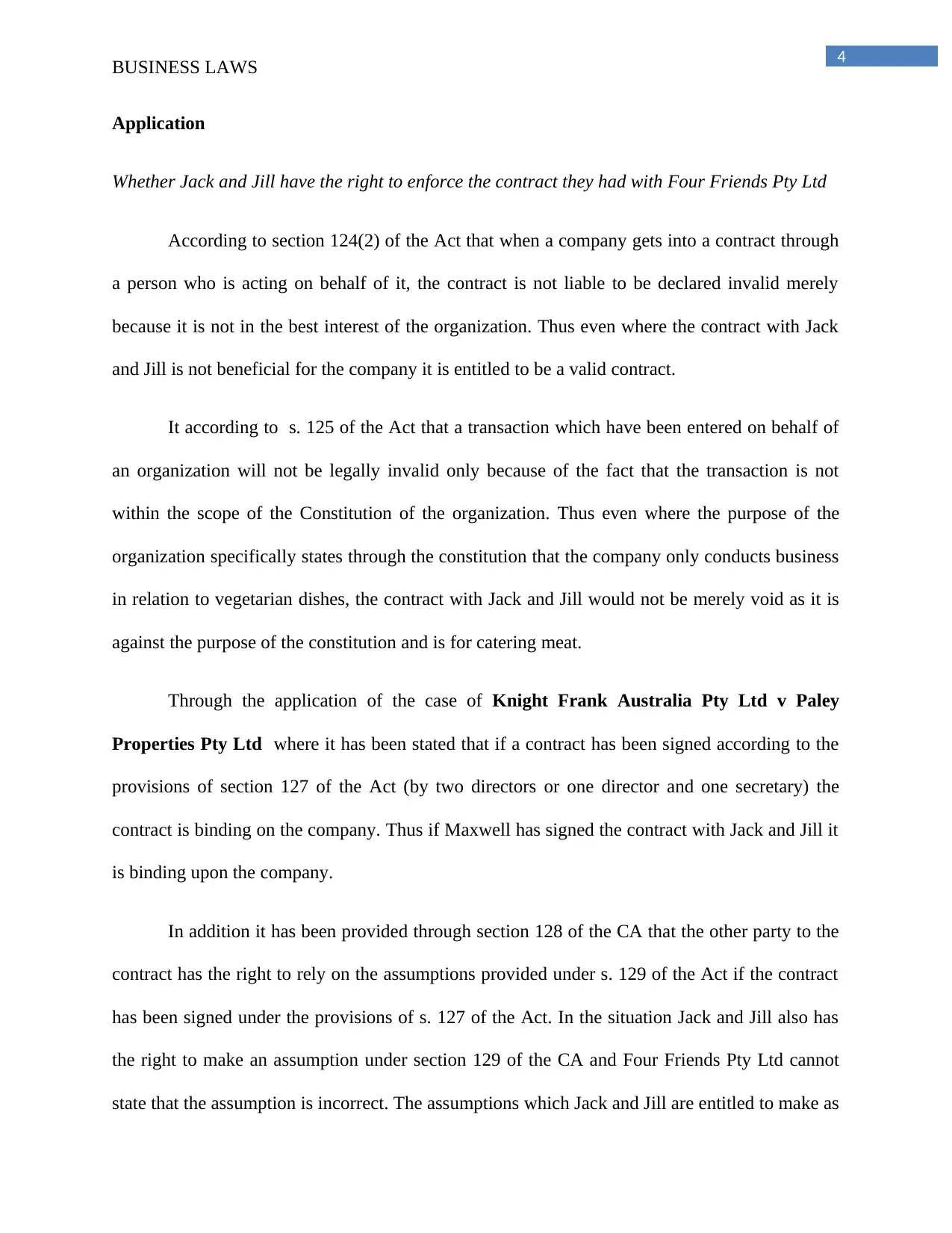
4
BUSINESS LAWS
Application
Whether Jack and Jill have the right to enforce the contract they had with Four Friends Pty Ltd
According to section 124(2) of the Act that when a company gets into a contract through
a person who is acting on behalf of it, the contract is not liable to be declared invalid merely
because it is not in the best interest of the organization. Thus even where the contract with Jack
and Jill is not beneficial for the company it is entitled to be a valid contract.
It according to s. 125 of the Act that a transaction which have been entered on behalf of
an organization will not be legally invalid only because of the fact that the transaction is not
within the scope of the Constitution of the organization. Thus even where the purpose of the
organization specifically states through the constitution that the company only conducts business
in relation to vegetarian dishes, the contract with Jack and Jill would not be merely void as it is
against the purpose of the constitution and is for catering meat.
Through the application of the case of Knight Frank Australia Pty Ltd v Paley
Properties Pty Ltd where it has been stated that if a contract has been signed according to the
provisions of section 127 of the Act (by two directors or one director and one secretary) the
contract is binding on the company. Thus if Maxwell has signed the contract with Jack and Jill it
is binding upon the company.
In addition it has been provided through section 128 of the CA that the other party to the
contract has the right to rely on the assumptions provided under s. 129 of the Act if the contract
has been signed under the provisions of s. 127 of the Act. In the situation Jack and Jill also has
the right to make an assumption under section 129 of the CA and Four Friends Pty Ltd cannot
state that the assumption is incorrect. The assumptions which Jack and Jill are entitled to make as
BUSINESS LAWS
Application
Whether Jack and Jill have the right to enforce the contract they had with Four Friends Pty Ltd
According to section 124(2) of the Act that when a company gets into a contract through
a person who is acting on behalf of it, the contract is not liable to be declared invalid merely
because it is not in the best interest of the organization. Thus even where the contract with Jack
and Jill is not beneficial for the company it is entitled to be a valid contract.
It according to s. 125 of the Act that a transaction which have been entered on behalf of
an organization will not be legally invalid only because of the fact that the transaction is not
within the scope of the Constitution of the organization. Thus even where the purpose of the
organization specifically states through the constitution that the company only conducts business
in relation to vegetarian dishes, the contract with Jack and Jill would not be merely void as it is
against the purpose of the constitution and is for catering meat.
Through the application of the case of Knight Frank Australia Pty Ltd v Paley
Properties Pty Ltd where it has been stated that if a contract has been signed according to the
provisions of section 127 of the Act (by two directors or one director and one secretary) the
contract is binding on the company. Thus if Maxwell has signed the contract with Jack and Jill it
is binding upon the company.
In addition it has been provided through section 128 of the CA that the other party to the
contract has the right to rely on the assumptions provided under s. 129 of the Act if the contract
has been signed under the provisions of s. 127 of the Act. In the situation Jack and Jill also has
the right to make an assumption under section 129 of the CA and Four Friends Pty Ltd cannot
state that the assumption is incorrect. The assumptions which Jack and Jill are entitled to make as
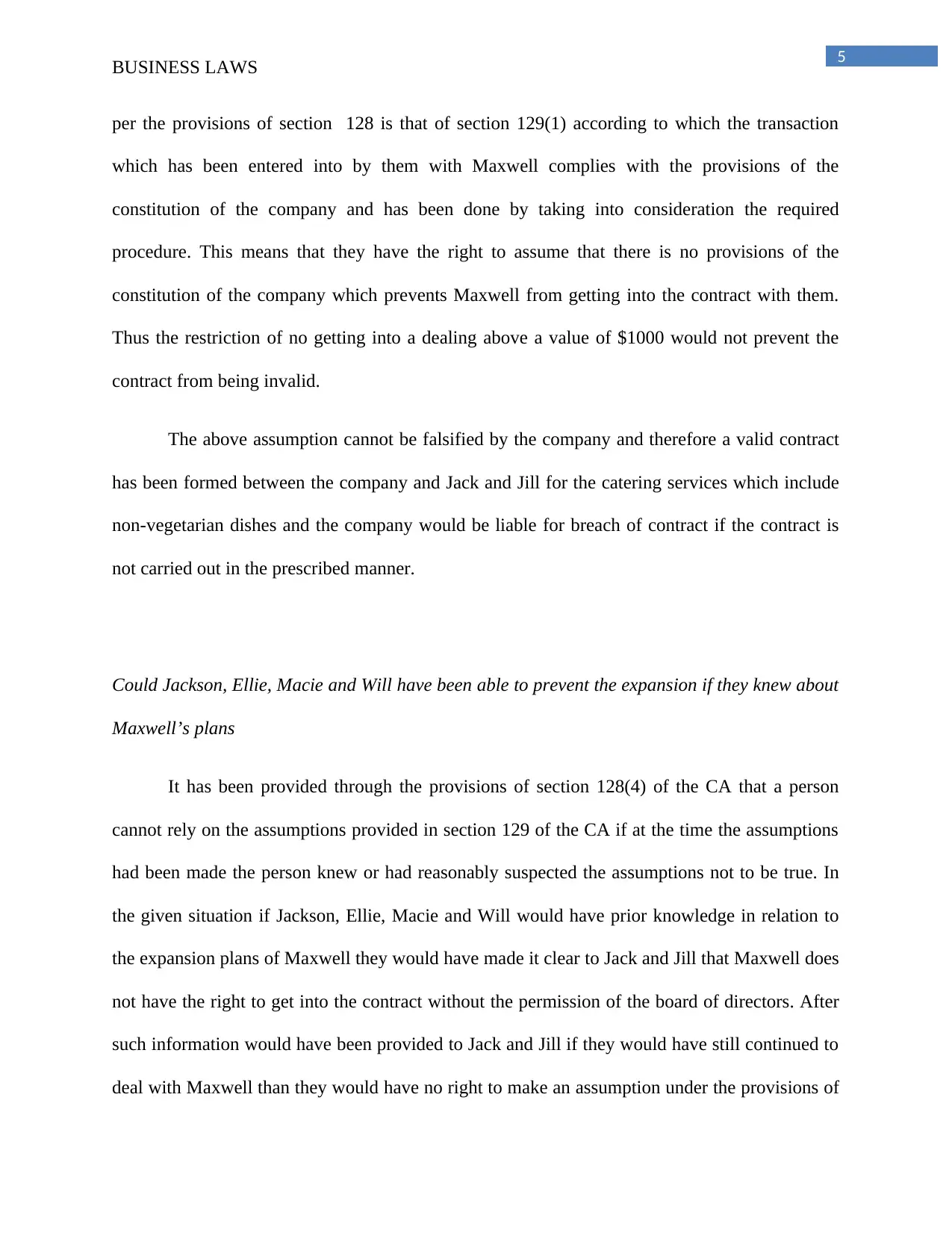
5
BUSINESS LAWS
per the provisions of section 128 is that of section 129(1) according to which the transaction
which has been entered into by them with Maxwell complies with the provisions of the
constitution of the company and has been done by taking into consideration the required
procedure. This means that they have the right to assume that there is no provisions of the
constitution of the company which prevents Maxwell from getting into the contract with them.
Thus the restriction of no getting into a dealing above a value of $1000 would not prevent the
contract from being invalid.
The above assumption cannot be falsified by the company and therefore a valid contract
has been formed between the company and Jack and Jill for the catering services which include
non-vegetarian dishes and the company would be liable for breach of contract if the contract is
not carried out in the prescribed manner.
Could Jackson, Ellie, Macie and Will have been able to prevent the expansion if they knew about
Maxwell’s plans
It has been provided through the provisions of section 128(4) of the CA that a person
cannot rely on the assumptions provided in section 129 of the CA if at the time the assumptions
had been made the person knew or had reasonably suspected the assumptions not to be true. In
the given situation if Jackson, Ellie, Macie and Will would have prior knowledge in relation to
the expansion plans of Maxwell they would have made it clear to Jack and Jill that Maxwell does
not have the right to get into the contract without the permission of the board of directors. After
such information would have been provided to Jack and Jill if they would have still continued to
deal with Maxwell than they would have no right to make an assumption under the provisions of
BUSINESS LAWS
per the provisions of section 128 is that of section 129(1) according to which the transaction
which has been entered into by them with Maxwell complies with the provisions of the
constitution of the company and has been done by taking into consideration the required
procedure. This means that they have the right to assume that there is no provisions of the
constitution of the company which prevents Maxwell from getting into the contract with them.
Thus the restriction of no getting into a dealing above a value of $1000 would not prevent the
contract from being invalid.
The above assumption cannot be falsified by the company and therefore a valid contract
has been formed between the company and Jack and Jill for the catering services which include
non-vegetarian dishes and the company would be liable for breach of contract if the contract is
not carried out in the prescribed manner.
Could Jackson, Ellie, Macie and Will have been able to prevent the expansion if they knew about
Maxwell’s plans
It has been provided through the provisions of section 128(4) of the CA that a person
cannot rely on the assumptions provided in section 129 of the CA if at the time the assumptions
had been made the person knew or had reasonably suspected the assumptions not to be true. In
the given situation if Jackson, Ellie, Macie and Will would have prior knowledge in relation to
the expansion plans of Maxwell they would have made it clear to Jack and Jill that Maxwell does
not have the right to get into the contract without the permission of the board of directors. After
such information would have been provided to Jack and Jill if they would have still continued to
deal with Maxwell than they would have no right to make an assumption under the provisions of
⊘ This is a preview!⊘
Do you want full access?
Subscribe today to unlock all pages.

Trusted by 1+ million students worldwide
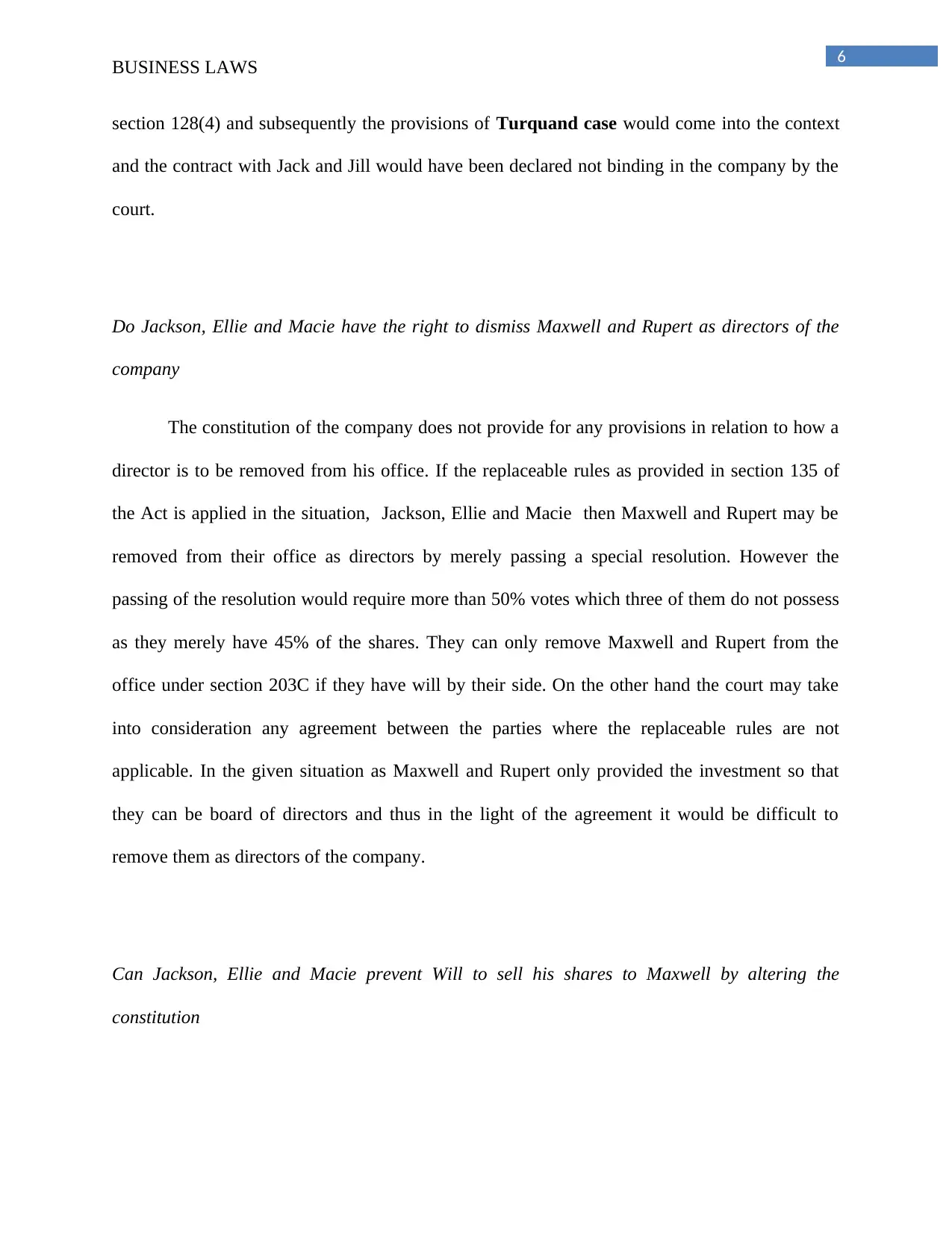
6
BUSINESS LAWS
section 128(4) and subsequently the provisions of Turquand case would come into the context
and the contract with Jack and Jill would have been declared not binding in the company by the
court.
Do Jackson, Ellie and Macie have the right to dismiss Maxwell and Rupert as directors of the
company
The constitution of the company does not provide for any provisions in relation to how a
director is to be removed from his office. If the replaceable rules as provided in section 135 of
the Act is applied in the situation, Jackson, Ellie and Macie then Maxwell and Rupert may be
removed from their office as directors by merely passing a special resolution. However the
passing of the resolution would require more than 50% votes which three of them do not possess
as they merely have 45% of the shares. They can only remove Maxwell and Rupert from the
office under section 203C if they have will by their side. On the other hand the court may take
into consideration any agreement between the parties where the replaceable rules are not
applicable. In the given situation as Maxwell and Rupert only provided the investment so that
they can be board of directors and thus in the light of the agreement it would be difficult to
remove them as directors of the company.
Can Jackson, Ellie and Macie prevent Will to sell his shares to Maxwell by altering the
constitution
BUSINESS LAWS
section 128(4) and subsequently the provisions of Turquand case would come into the context
and the contract with Jack and Jill would have been declared not binding in the company by the
court.
Do Jackson, Ellie and Macie have the right to dismiss Maxwell and Rupert as directors of the
company
The constitution of the company does not provide for any provisions in relation to how a
director is to be removed from his office. If the replaceable rules as provided in section 135 of
the Act is applied in the situation, Jackson, Ellie and Macie then Maxwell and Rupert may be
removed from their office as directors by merely passing a special resolution. However the
passing of the resolution would require more than 50% votes which three of them do not possess
as they merely have 45% of the shares. They can only remove Maxwell and Rupert from the
office under section 203C if they have will by their side. On the other hand the court may take
into consideration any agreement between the parties where the replaceable rules are not
applicable. In the given situation as Maxwell and Rupert only provided the investment so that
they can be board of directors and thus in the light of the agreement it would be difficult to
remove them as directors of the company.
Can Jackson, Ellie and Macie prevent Will to sell his shares to Maxwell by altering the
constitution
Paraphrase This Document
Need a fresh take? Get an instant paraphrase of this document with our AI Paraphraser
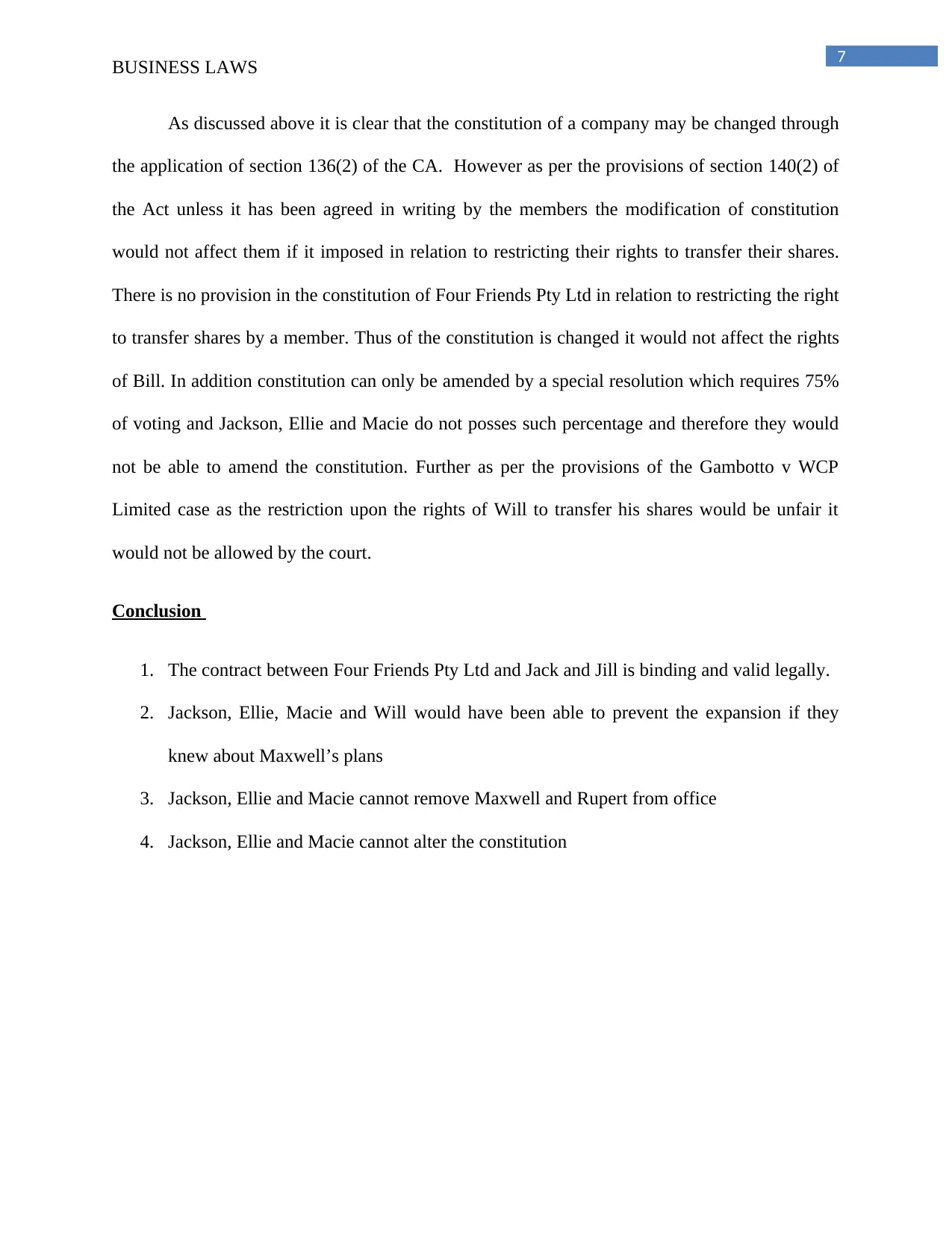
7
BUSINESS LAWS
As discussed above it is clear that the constitution of a company may be changed through
the application of section 136(2) of the CA. However as per the provisions of section 140(2) of
the Act unless it has been agreed in writing by the members the modification of constitution
would not affect them if it imposed in relation to restricting their rights to transfer their shares.
There is no provision in the constitution of Four Friends Pty Ltd in relation to restricting the right
to transfer shares by a member. Thus of the constitution is changed it would not affect the rights
of Bill. In addition constitution can only be amended by a special resolution which requires 75%
of voting and Jackson, Ellie and Macie do not posses such percentage and therefore they would
not be able to amend the constitution. Further as per the provisions of the Gambotto v WCP
Limited case as the restriction upon the rights of Will to transfer his shares would be unfair it
would not be allowed by the court.
Conclusion
1. The contract between Four Friends Pty Ltd and Jack and Jill is binding and valid legally.
2. Jackson, Ellie, Macie and Will would have been able to prevent the expansion if they
knew about Maxwell’s plans
3. Jackson, Ellie and Macie cannot remove Maxwell and Rupert from office
4. Jackson, Ellie and Macie cannot alter the constitution
BUSINESS LAWS
As discussed above it is clear that the constitution of a company may be changed through
the application of section 136(2) of the CA. However as per the provisions of section 140(2) of
the Act unless it has been agreed in writing by the members the modification of constitution
would not affect them if it imposed in relation to restricting their rights to transfer their shares.
There is no provision in the constitution of Four Friends Pty Ltd in relation to restricting the right
to transfer shares by a member. Thus of the constitution is changed it would not affect the rights
of Bill. In addition constitution can only be amended by a special resolution which requires 75%
of voting and Jackson, Ellie and Macie do not posses such percentage and therefore they would
not be able to amend the constitution. Further as per the provisions of the Gambotto v WCP
Limited case as the restriction upon the rights of Will to transfer his shares would be unfair it
would not be allowed by the court.
Conclusion
1. The contract between Four Friends Pty Ltd and Jack and Jill is binding and valid legally.
2. Jackson, Ellie, Macie and Will would have been able to prevent the expansion if they
knew about Maxwell’s plans
3. Jackson, Ellie and Macie cannot remove Maxwell and Rupert from office
4. Jackson, Ellie and Macie cannot alter the constitution
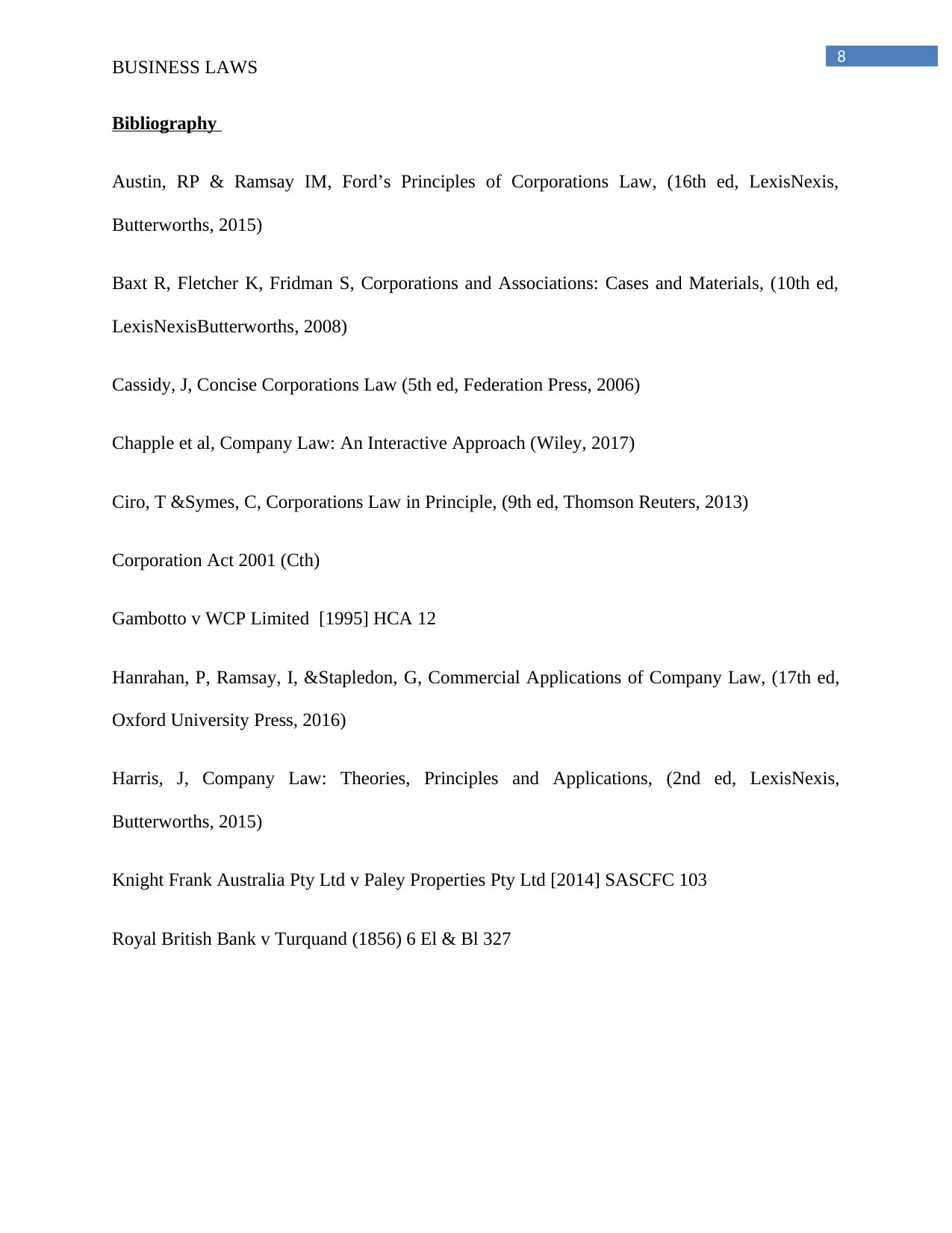
8
BUSINESS LAWS
Bibliography
Austin, RP & Ramsay IM, Ford’s Principles of Corporations Law, (16th ed, LexisNexis,
Butterworths, 2015)
Baxt R, Fletcher K, Fridman S, Corporations and Associations: Cases and Materials, (10th ed,
LexisNexisButterworths, 2008)
Cassidy, J, Concise Corporations Law (5th ed, Federation Press, 2006)
Chapple et al, Company Law: An Interactive Approach (Wiley, 2017)
Ciro, T &Symes, C, Corporations Law in Principle, (9th ed, Thomson Reuters, 2013)
Corporation Act 2001 (Cth)
Gambotto v WCP Limited [1995] HCA 12
Hanrahan, P, Ramsay, I, &Stapledon, G, Commercial Applications of Company Law, (17th ed,
Oxford University Press, 2016)
Harris, J, Company Law: Theories, Principles and Applications, (2nd ed, LexisNexis,
Butterworths, 2015)
Knight Frank Australia Pty Ltd v Paley Properties Pty Ltd [2014] SASCFC 103
Royal British Bank v Turquand (1856) 6 El & Bl 327
BUSINESS LAWS
Bibliography
Austin, RP & Ramsay IM, Ford’s Principles of Corporations Law, (16th ed, LexisNexis,
Butterworths, 2015)
Baxt R, Fletcher K, Fridman S, Corporations and Associations: Cases and Materials, (10th ed,
LexisNexisButterworths, 2008)
Cassidy, J, Concise Corporations Law (5th ed, Federation Press, 2006)
Chapple et al, Company Law: An Interactive Approach (Wiley, 2017)
Ciro, T &Symes, C, Corporations Law in Principle, (9th ed, Thomson Reuters, 2013)
Corporation Act 2001 (Cth)
Gambotto v WCP Limited [1995] HCA 12
Hanrahan, P, Ramsay, I, &Stapledon, G, Commercial Applications of Company Law, (17th ed,
Oxford University Press, 2016)
Harris, J, Company Law: Theories, Principles and Applications, (2nd ed, LexisNexis,
Butterworths, 2015)
Knight Frank Australia Pty Ltd v Paley Properties Pty Ltd [2014] SASCFC 103
Royal British Bank v Turquand (1856) 6 El & Bl 327
⊘ This is a preview!⊘
Do you want full access?
Subscribe today to unlock all pages.

Trusted by 1+ million students worldwide
1 out of 9
Related Documents
Your All-in-One AI-Powered Toolkit for Academic Success.
+13062052269
info@desklib.com
Available 24*7 on WhatsApp / Email
![[object Object]](/_next/static/media/star-bottom.7253800d.svg)
Unlock your academic potential
Copyright © 2020–2026 A2Z Services. All Rights Reserved. Developed and managed by ZUCOL.




